Covid-19 lockdown: While thousands of us have been turning to local mutual aid groups during the pandemic, Lauren Henshaw went one step further
After asking members of her local Facebook group for Cheadle Hulme in Stockport whether there was a Covid-19 support group in the area, Henshaw – an operations director, who lives with her partner, Dave, and two-year-old daughter Beatrice – was surprised to find the answer was a resounding no. “Another woman and I realised nothing seemed to exist, so we discussed setting one up ourselves,” she says.
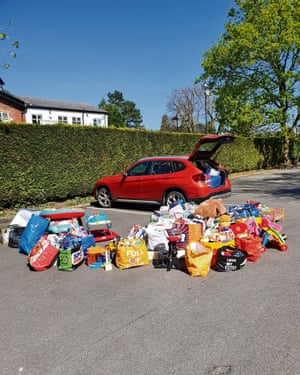 [contfnewc] FacebookTwitterPinterest[contfnewc]
[contfnewc] FacebookTwitterPinterest[contfnewc]Within days, Henshaw and fellow resident Roshini Latham had launched the Helping Hands Cheadle Hulme Facebook group, with the aim of sharing advice and matching people in need with volunteers or goods. “We bought pay-as-you-go phones and a local printing shop made leaflets which – with the postmans help – we delivered to vulnerable people, targeting those in sheltered accommodation and the elderly,” she says. “At first, it was a volunteer-led service where people called us and Roshini and I would do things like shop for those who were isolating, pick up prescriptions and walk dogs. Then we started putting shoutouts on the Facebook group to match those in need with people who could help.”
In recent weeks, the groups focus has shifted to include not just older people and high-risk individuals, but others in need of help too. “Now, most of that demographic have received letters from the government, local medical practices are involved in their care and food is more readily available,” she says. So, the idea of a “family bank” was born, designed to support those who wouldnt necessarily ask for help. “So many people are falling through the gaps – you have to be registered to receive vouchers from the food bank for example, but many people arent yet. Then there are people like hairdressers who lost income overnight. We wanted to help people like that, and be a useful resource to the community.”
The family bank works via Facebook requests, with Henshaw and Latham asking members to donate things such as childrens toys or nappies, which are then taken to a local car park for Henshaw to collect. Adhering to strict social distancing guidelines, its a major undertaking. “I travel alone, take antibacterial wipes and wear gloves and everybody leaves items in the centre of the car park, and when I drop donations off, I knock on the door and wave from the car at a distance,” she says. Her now-deserted office at a local industrial estate has become a temporary storage space for donations. It isnt without its difficulties, though. “The sheer scale of donations is huge and social distancing means its just me alone. I havent had time to sift through it all – Id like to organise it by age and gender so I can quickly grab whats needed.”
Henshaw and Latham have also enlisted the help of local businesses. “Weve run Q&A sessions with a local HR consultancy for people confused about employment rights or being furloughed. A local accountancy firm has offered free webinars for small business owners, and a nearby golf club has donated soup, which I distribute through local community groups to care homes, hospitals and vulnerable people.” Restaurants have also offered to cook meals, delivered by volunteers.
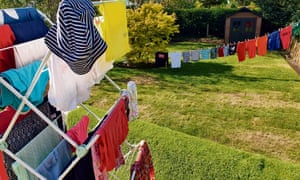 [contfnewc] FacebookTwitterPinterest[contfnewc]
[contfnewc] FacebookTwitterPinterest[contfnewc]Day-to-day, the pair have little time to stop and think about how far theyve come. “Sometimes I feel totally overwhelmed – as admins of the Facebook group, Roshini and I are constantly monitoring requests or messages and manning volunteer phones,” she says. “Were also liaising with people offering services, handing out leaflets, dropping off goods and applying for council grants.” And when daughter Beatrice takes her lunchtime nap, Henshaw takes the opportunity to drop off more donations, with plans already underway to set up a fundraiser to pay for a storage container, cleaning products and ingredients for meals. “Im not getting much sleep,” she admits. “But then you take a bag of clothes to a family in need and realise why youre doing it.”
All of us will need support one day; why not help now?
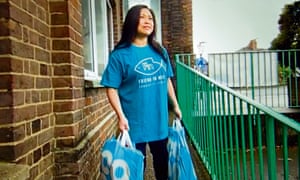 [contfnewc] FacebookTwitterPinterest[contfnewc]
[contfnewc] FacebookTwitterPinterest[contfnewc]Jesse Tan has always provided a lifeline for older people and, alongside a bevy of colleagues and volunteers, she is determined that during the lockdown those same people dont become isolated.
Tan is the office manager of the Friend In Need (FIN) Community Centre in East Barnet, London, and is one of the many people around the country working on the frontline of community care during the Covid-19 crisis. “I live everyday knowing that our jobs are making a very significant difference to the people who are now locked down, desperate at home,” she says.
Usually a busy day at the centre would involve welcoming visitors for anything from yoga classes, to tai chi or lunch clubs. “Our main reason for doing that is to battle loneliness, its a lot of prevention work because people come to build friendships and to socialise.”
But the day after the nationwide lockdown was announced, on 23 March, that all changed. With all of their usual activities put on hold, Tan and her colleagues had to swiftly mobilise to provide support for their clients, who are on average aged between 85 and 90.
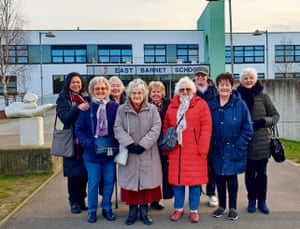 [contfnewc] FacebookTwitterPinterest[contfnewc]
[contfnewc] FacebookTwitterPinterest[contfnewc]They created both a Covid-19 community response group, to help with shopping, prescriptions and small DIY jobs, and a specialised mental health fitness team, to provide a check-in service over the phone. “Some had no one to collect their prescriptions or no food, or they had minor damages to their homes that made them worried or anxious,” she says. “Our calls have been very welcome as they were getting into a state of desperation, which – if not attended to – might trigger more severe problems.”
Thankfully FIN has been inundated with offers of help from local people. “We have been recruiting volunteers who are placed in contact with an older person to make sure they are looked after. I can sense the spirit of community, because most of the people who have come forward to support us are people who wouldnt usually.
“I interview every new volunteer personally, and it does come across very clearly that we all have good in ourselves and it will come out at a difficult time. Its the human in us.”
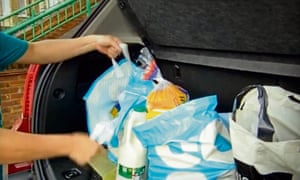 [contfnewc] FacebookTwitterPinterest[contfnewc]
[contfnewc] FacebookTwitterPinterest[contfnewc]As Tan explains, small acts of kindness by multiple individuals can, together, make a huge positive impact within a community. “All of the volunteers do a small part of the work. They each carry out one or two small tasks a week, but together the team has made a very significant difference to the services we can provide. I always tell them: Every little helps.”
It is not always easy to provide support though. With their usual schedule cancelled, Tan says that FIN is without a lot of its usual funding: “We normally collect a nominal charity fee from the people who attend our services, but we have lost all that. We have been left with a very small amount of funding. We are at risk of closing down in two months as the money that weve been saving has all been invested into the services we provide,” she says. “If people cant give their time, it would be helpful if they consider donating.”
But for those who can give their time, there really is no time like the present, with an estimated 8.8 million people over 70 who have been advised to remain at home.
Tan says: “I always tell the younger people I work with: All of us will grow old. One day most of us will need some support. Would you help the people who are old and vulnerable and who need us today? They contributed to this country. They need us now.”
The wellbeing of our community is our top priority
With the football season shut down indefinitely, a team in Scotland, Stenhousemuir FC, turned their energy to the community. Within days of the lockdown being announced a hotline was set up to help local people, and a 30-strong squad of volunteers assembled in the first week to carry out tasks, such as dog walking and shopping, for those in isolation. Since then the number of volunteers has hit 80.
The idea has been well received, so much so organisers have branched out to ease the strain on parents by collecting school lunches from a local high school and distributing them to children stuck indoors. On just one day last month, volunteers delivered more than 130 meals.
Stenhousemuir FC chairman Iain McMenemy, who helped to organise the initiative, says: “Its clear that there will be a significant impact on football and we will
no doubt be affected by this. However, there are more important matters. The coronavirus will affect thousands within our communities. The wellbeing of friends, neighbours and our community should be our top priority.”
This advertiser content was paid for by the UK government. Stay at Home is a government-backed initiative tasked with informing the UK about the Covid-19 pandemic.





